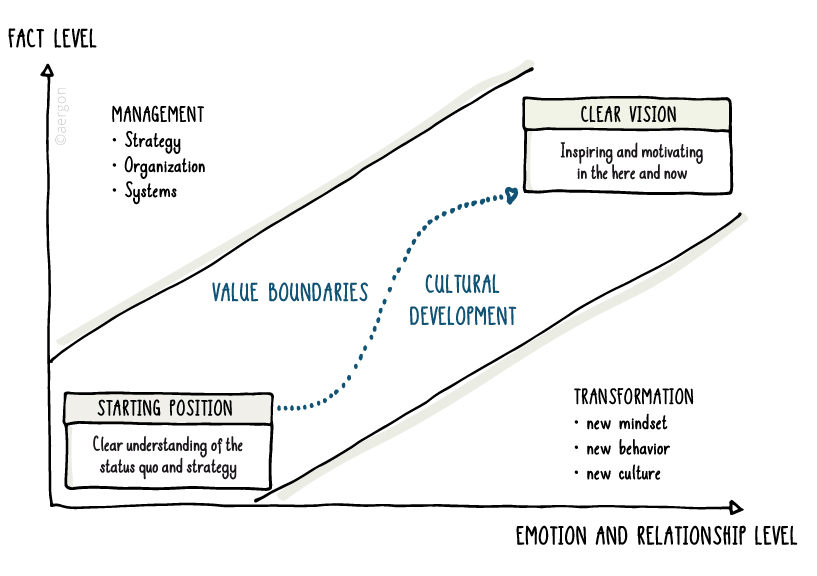Leadership
Transformation-Workshops
Psychology, people’s conscious and unconscious experience and behavior, is probably the No. 1 factor that promotes, obstructs or even prevents internal processes, necessary management initiatives and even digitalization from coming to fruition.
Even the best initiatives can fail because of employees’ fears and ego and the lack of technical know-how among managers. And what’s more, they are not even aware of this unconscious incompetence – not knowing what one does not know. Almost all companies have long-standing, well-defined management guidelines and a code of conduct and values. Furthermore, most companies not only offer comprehensive management-qualification programs, but they also make them a prerequisite for management positions. So on paper, all companies should have excellent corporate cultures.
However, the above is often reflected only partially or not at all in managers’ behavior. Yet most of the time they are unaware of this, and instead blame circumstances or others (e.g. their employees) if financial results and human relationships do not correspond to corporate goals. Unfortunately, external circumstances and other people usually cannot be changed and managers often fail to use strongest management tool: themselves!
In order to be able to carry out a cultural transformation at all, one needs greater self-awareness. It is important to understand how perception and actions are influenced, and how managers can recognize and above all effectively adapt their patterns of perception and behavior. To change one’s habits, one first need to become aware of them and to identify whether they are effective or rather obstructive. The change process is a whole new ball game, requiring peace and deliberation, but above all time. This is why we do not offer a “one size fits all” approach for a cultural transformation, but only well-chosen elements as part of a comprehensive process.
We use polyvalent, psychologically sound and above all logical models from our proven program. These also provide fact-oriented managers with good visibility into the cultural side of their work and enable effective orientation in the context of the vision.
Rollout Workshops
The purpose of these workshops is to systematically apply the most important elements and insights gained from the Transformation Workshops to the next management level.
Leadership Workshops
Because values and people from different generations always have and always will continue to change the world of work, new types of leadership are continuously needed. On the one hand, hierarchies and status are losing significance, but on the other hand, younger employees in particular want clear leadership and decisions as well as individual support, integration and freedom. Whereas empathy and esteem used to be documented or rewarded in the form of financial compensation, today's employees want more than anything to experience such sentiments on a day-to-day basis. However, this also requires (new) skills and, above all, new managerial attitudes.
In our Leadership Workshops, we address these attitudes, the control of ambiguity between leading and letting go, proximity and distance, and the ownership of the system, as well as often quoted but rarely (effectively) used tools, such as (correctly) delegating, adjusting, praising and criticizing. Above all, however, we focus on the individual perceptions of employees, their values and their needs.
Over a period of 2 years, the entire management team of Berufsbildungswerk Waiblingen gGmbH participated in an outstanding, multi-level program for transformational leadership with Beate Junginger. Through a very good mixture of professional input and practical exercises, as well as implementation tasks and telephone coaching between the workshops, we have achieved extremely positive and tangible effects in leadership quality. Many managers found it to be the most effective and best advanced training in their career to date.
Roman Hanle, Managing Director, Berufsbildungswerk Waiblingen gGmbH
Train-the-Trainer workshops
To ensure comprehensive cultural transformation, these workshops provide selected managers and participants from the Rollout Workshops with the knowledge and skills they will need to implement the next phase. In the next phase, they will convey the most important transformation elements and tools to the remaining employees. When selecting suitable participants, the most important consideration is whether they possess the enthusiasm and charisma needed to get their colleagues on board. We place less emphasis on professional experience, for example a background in human resources.
The individually adapted trainer manuals are a valuable compendium of all content, exercises and workshop concepts as well as didactic tips, which is a valuable companion and anchor for internal trainers before, during and after the internal Rollout Workshops.
Online manuals and self-learning platform aergon campus
In order to support managers during the transformation process, to integrate the content into everyday life and to roll it out at lower levels, participants have access to a web-based self-learning platform for managers and team members. All workshop contents are described in detail, there are a total of 40 exercises, videos, book tips and above all a detailed training program for 12 months.


